Did you know you can get the Sprott Money Weekly Wrap Ups, Ask The Expert,
special promotions and insightful blog posts sent right to your inbox?
Sign up to the Sprott Money Newsletter here.
March has been a very challenging month for precious metal investors. However, it has been a difficult month for commodities across the board. Why? The surging Dollar Index is the primary culprit.
And it's not just March. The full first quarter of 2021 has begun poorly for COMEX gold and silver. As March draws to a close, COMEX gold is already down over 10% year-to-date with COMEX silver down nearly the same, despite an incredible surge of retail investment demand that wiped clean the shelves of nearly every major bullion dealer on the planet.
Why the tough start to the year? Let's start by checking the two key inputs used by the HFT trading machines in deciding whether or not to buy or sell COMEX futures. And what are these two inputs? The yield on the U.S. 10-year note and the price of the U.S. Dollar Index.
As you can see below, both have soared to begin 2021, with the 10-year note yield moving from 0.95% at the close of 2020 to today's 1.75%. That's nearly double! In turn, the Dollar Index has responded by moving higher from slightly below 90 to just above 93.
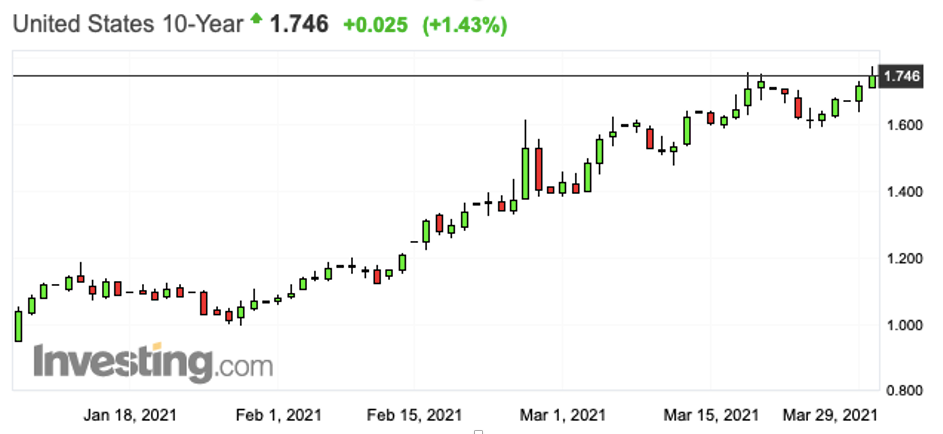
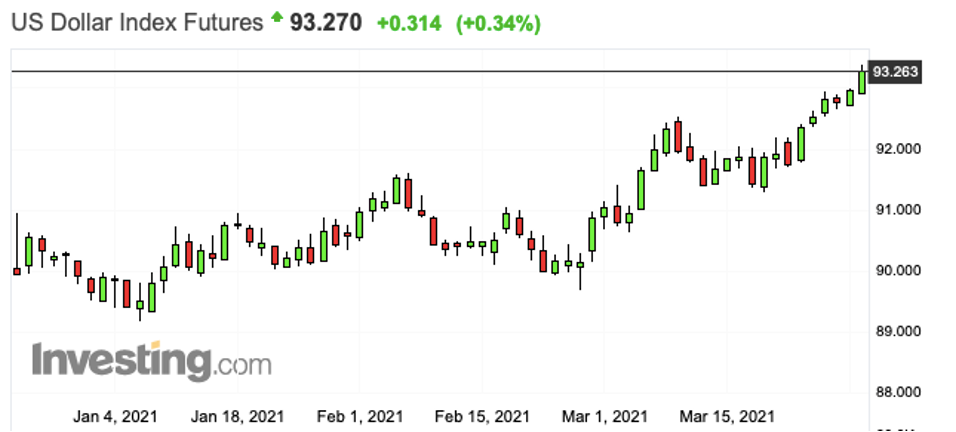
As nominal (stated) interest rates have risen, the sharply negative inflation-adjusted or "real" interest rates that drove COMEX gold to new all-time highs in 2020 have evaporated. Whereas real rates reached -1.0% last August, they are now even at 0.00%. So the rising yields, falling real yields, and a rising dollar have all conspired to drive COMEX gold backward, and it's now back to the same price levels seen as recently as last June.
While we await the Fed to take their inevitable steps toward a policy of Yield Curve Control, prices may fall even farther. How much farther remains to be seen, but once the Fed moves to cap long-term interest rates, COMEX gold will resume its rally that began in late 2018 with a move back to the highs seen last August as the initial price target.
However, the price action of the past month has not simply been an interest rate issue. Instead, over the course of March, the U.S. Dollar Index has surged over 3%. This has forced those HFT machines to sell commodities across the board, with some down as much as 10%.
Take copper, for example. Back in February, the price reached multi-year highs near $4.40 as global infrastructure spending is set to surge in 2021. But it has since pulled back to $4. That's a drop of 11%. Why? The Machines that trade the COMEX derivative contract see the 3+% rise in the dollar and sell, sell, sell.
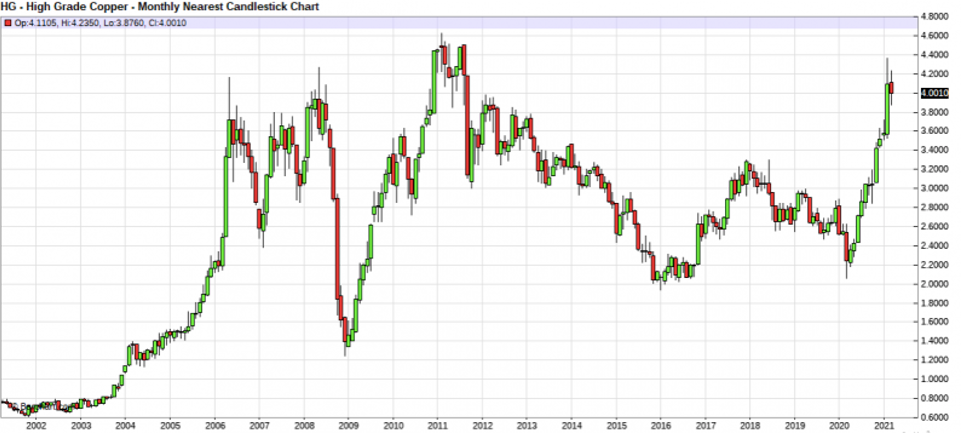
What about crude oil? Just three weeks ago, it traded to $68/barrel before falling all the way back to $58 and a last just above $60. This places it down over 10% too.
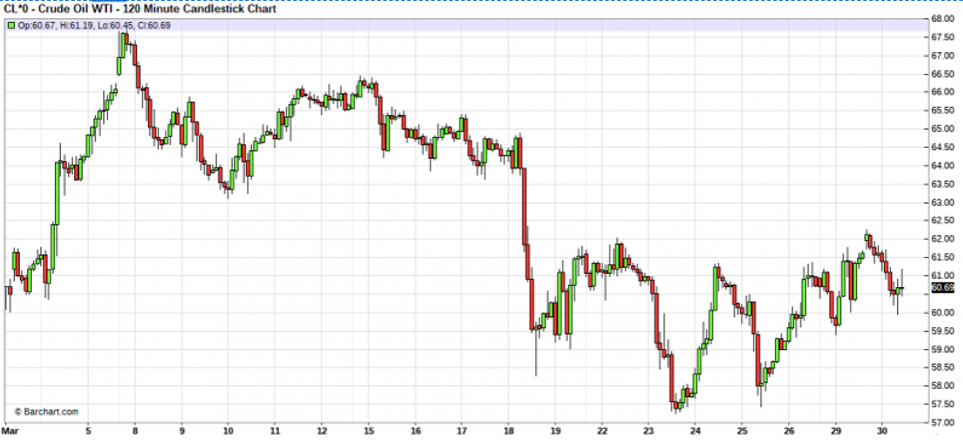
So now when you scratch your head and try to figure out how in the world silver prices could be falling when physical demand is soaring, at least you know why. The HFT machines DO NOT CARE about physical supply and demand. They simply "see" the rising dollar and they sell the futures contracts that are utilized to discover price within the current fractional reserve and digital derivative pricing scheme.
Again, over the course of March, copper and crude are both down over 10%. Thus it should come as no surprise that the same machines that were selling those commodities would be selling silver too. And they are. The May21 COMEX silver began the month at $26.90 and it currently trades at $24.20. That's almost precisely 10% lower.
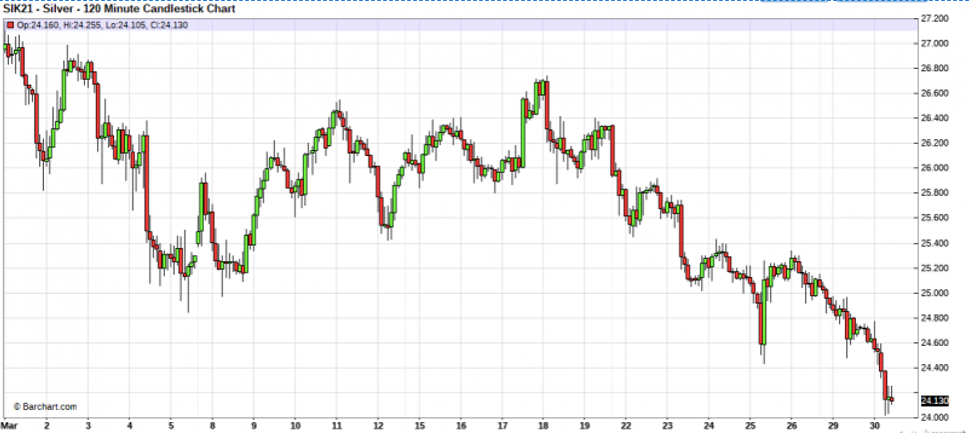
Knowing that these short-term trends will one day soon change again in our favor, we wait. Though the Fed is obviously quite reluctant to even mention Yield Curve Control (because it truly is the final "tool in the toolbox"), this policy change is most assuredly and 100% coming. However, the Fed's reticence may continue for a while longer, so we need a U.S. dollar trend change first.
As you can see below, once the Dollar Index broke above 92 last week, a move toward 94 became inevitable...and we're nearly there already. The key will be the resistance at 94. If the index can stall near that level, it will likely enter into a period of consolidation and rangebound trading between 92 and 94 like we saw late last year. Should this happen, the relentless machine selling pressure on the commodity derivative contracts will ease.
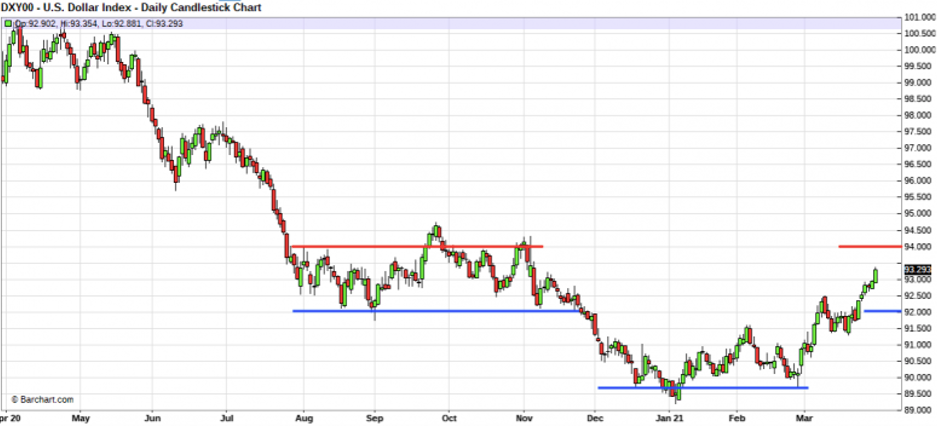
So take heart. The year 2021 has begun poorly for the precious metals, but just as we saw in 2020, things can change pretty quickly in Q2 and beyond. The key will be an end to this bounce in the U.S. dollar followed by a Fed-capping reversal in long-term interest rates. Once these two events happen, COMEX precious metal prices will recover and move back toward the highs seen in the summer of 2020.
Don’t miss a golden opportunity.
Now that you’ve gained a deeper understanding about gold, it’s time to browse our selection of gold bars, coins, or exclusive Sprott Gold wafers.
About Sprott Money
Specializing in the sale of bullion, bullion storage and precious metals registered investments, there’s a reason Sprott Money is called “The Most Trusted Name in Precious Metals”.
Since 2008, our customers have trusted us to provide guidance, education, and superior customer service as we help build their holdings in precious metals—no matter the size of the portfolio. Chairman, Eric Sprott, and President, Larisa Sprott, are proud to head up one of the most well-known and reputable precious metal firms in North America. Learn more about Sprott Money.
Learn More
You Might Also Like:














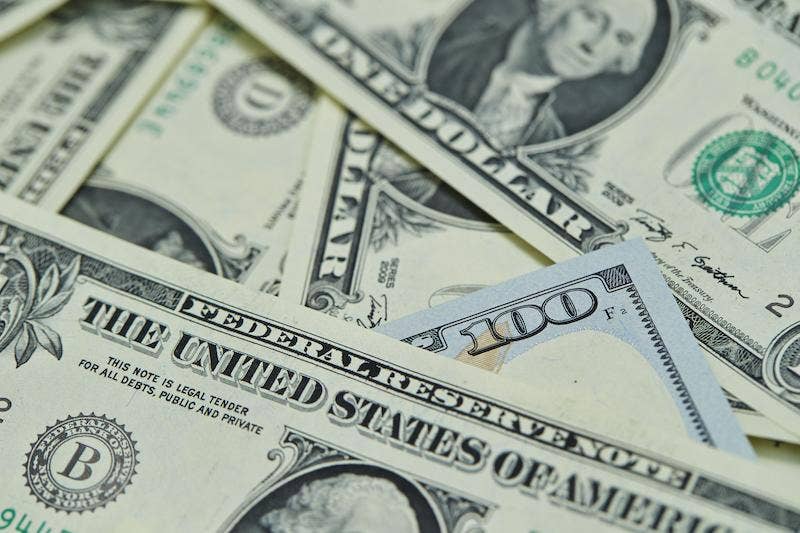



Looks like there are no comments yet.